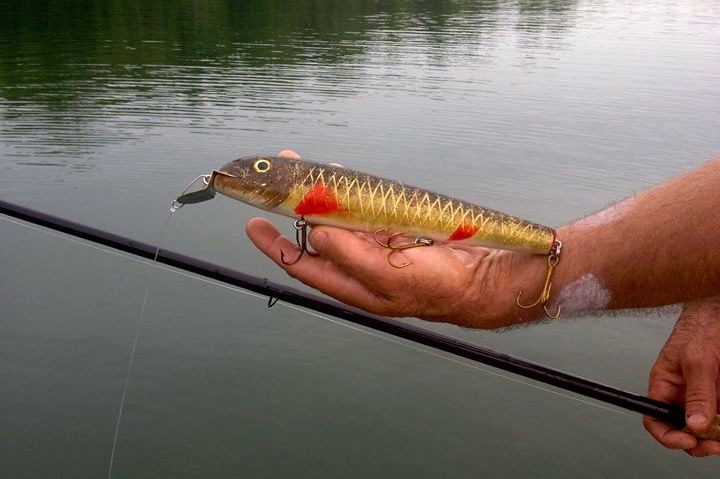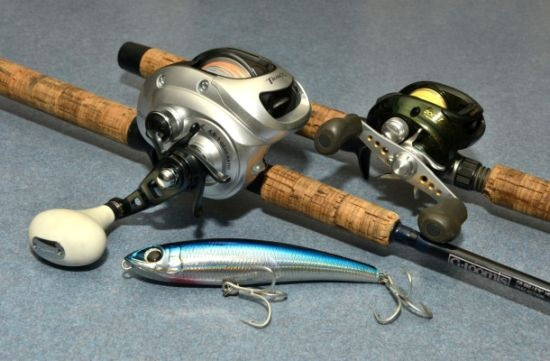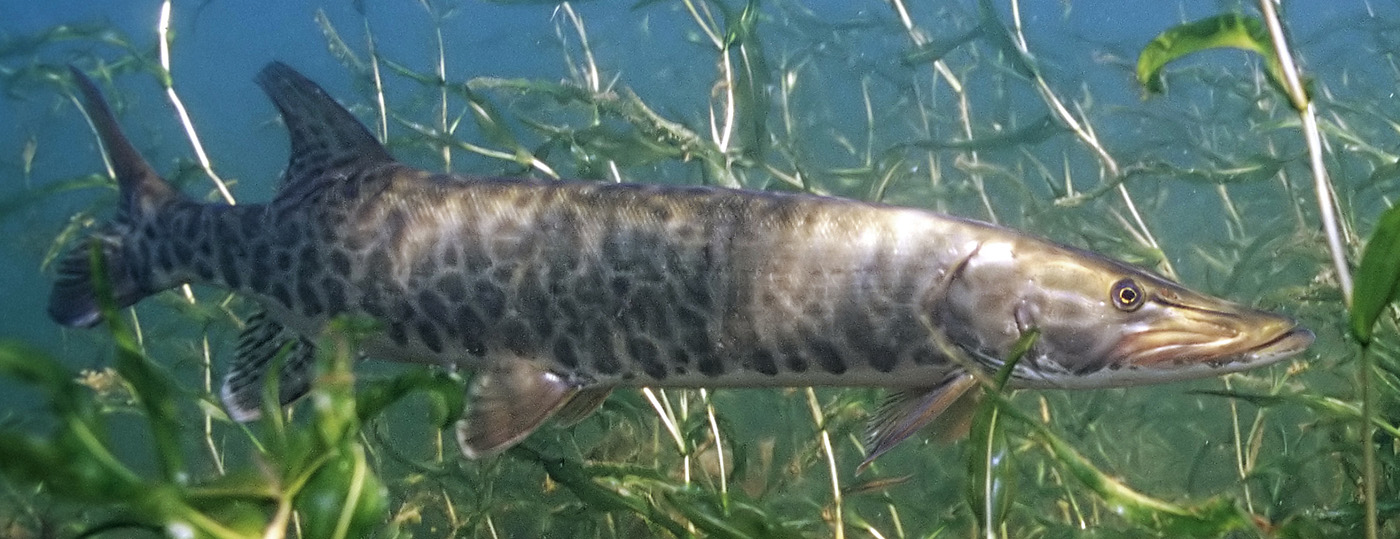The quick answer is with lot’s of prayer. I personally believe that you cannot catch a Muskie but that you trick them into catching themselves. I’ve been Muskie fishing for years and never caught a Muskie. Not even close! I’ve heard that it takes 10,000 casts to catch your first Muskie. Wow! That means I’ll never catch one. Last year I was at Greer’s Pier & Marina buying bait when a young 10 year kid told me he has caught two Muskie’s. I looked at him with a ‘yeah sure you did’ kind of look and his brother and his dad confirmed the kids account with a head shaking eye roll and a muffled comment which sounded something like they have never heard the end of it. But, I’m not sure. What a punk!
There’s rumor, legend has it, folklore, and down right lies, and all of them come into play when trying to catch the elusive Muskie. That’s one big reason why I fish for Muskie – for the bragging rights. Also, my grandfather has photos of himself and several fishing buddies taken outside Little Bo with a large number of Muskies on the ground that all of them caught in one day. The picture was taken in 1944. I love that photo. He passed away in 1947. I once heard a story from a reliable source where a Muskie bite a tennis ball thrown into the water for a dog to retrieve. A Muskie swirled out of the water and grabbed the ball never to be seen again, until it was found dead floating in the water with a tennis ball stuck in it’s teeth. It drowned! Wow. My friend caught a giant Muskie through the ice several years back. I saw the photo. Both of these stories have been confirmed by eye witnesses. I know people who catch Muskies off their pier on Island Lake on the Manitowish chain. And, to make it worse, they talk about it like it was no big deal.
 The Indians call the Muskie “maashkinoozhe”, meaning “ugly pike”, as the Muskie is the largest relative of the pike family. In all honesty Muskie’s scare the hell out me. Those teeth give me the creeps and I don’t want to end up on one of the worlds dumbest videos as a Muskie beats me up and sends me to the emergency room for multiple lacerations. I don’t really know why I want to catch a Muskie as I think I would freak out if I ever actually had one on the line. I’m basically a candy a– and I freely admit that a Muskie is tougher than I am. Even the size of the bait scares me.
The Indians call the Muskie “maashkinoozhe”, meaning “ugly pike”, as the Muskie is the largest relative of the pike family. In all honesty Muskie’s scare the hell out me. Those teeth give me the creeps and I don’t want to end up on one of the worlds dumbest videos as a Muskie beats me up and sends me to the emergency room for multiple lacerations. I don’t really know why I want to catch a Muskie as I think I would freak out if I ever actually had one on the line. I’m basically a candy a– and I freely admit that a Muskie is tougher than I am. Even the size of the bait scares me.
The question of whether to cast or troll for muskies often draws strong opinions. Most anglers have a preference, and many are entrenched in one discipline or the other. Some even express disdain for the others approach. Without making judgments or offering exceptions to every rule, some basic guidelines exist when pondering the best approach.
Trolling Advantages
For efficiency in covering water, trolling has an unquestioned edge. Obviously, an angler can only cast and retrieve with one rod at a time. Many state agencies allow anglers to deploy two or three or more rods. Expansive trolling spreads become possible.
Multiple rods mean that lures of various sizes, colors, actions, and running depths can be used at the same time to test depth and lure preference. And with planer boards keeping lures away from the boat, the area of coverage expands a great deal. If one assumes that a muskie can detect a bait within a 20-foot radius, staggering six trolling lines increases coverage to 120 feet or more. Also, the boat itself can attract curious fish into the spread, or else push fish out into the path of the trolled lures.
There are some who believe that trolling is like cheating, while casting is like using a purists way to fish. Sort of like trout fishing. There are rules to the beauty and the rhythm of fly fishing. Fishing for Muskie doesn’t include either of those two things. Trolling to cover large featureless areas for scattered fish is one way to catch a Muskie but casting is one way as well.
 Many experts believe that modern electronics have increased the precision of trolling dramatically. With side-imaging a fisherman can scan 120 feet on both sides of the boat. If I mark variations in bottom, scattered weeds, baitfish, or a muskie, one can modify a trolling pass to place a planer board and lure on target. With Humminbird’s 360 imaging, you can scout ahead of the boat as well. We can adjust course as our electronics provide real-time information about everything around the boat.
Many experts believe that modern electronics have increased the precision of trolling dramatically. With side-imaging a fisherman can scan 120 feet on both sides of the boat. If I mark variations in bottom, scattered weeds, baitfish, or a muskie, one can modify a trolling pass to place a planer board and lure on target. With Humminbird’s 360 imaging, you can scout ahead of the boat as well. We can adjust course as our electronics provide real-time information about everything around the boat.
Trolling also excels when fishing deep water and seeking maximum running depth from lures. To target muskies holding deeper than 20 feet, casting a deep diver is inefficient. On an 80-foot cast, the lure is diving during the first 20 feet, and rising over the last 20 feet of the retrieve. Maximum depth is reached only for 40 feet. That’s a lot of work for 40 feet of coverage. Trolling is like an indefinitely long cast with near total efficiency from a depth perspective. Trolled lures also achieve greater depth when a lot of line is released, over 50 yards in some cases.
Even with powerful new reels like Shimano’s Tranx and Abu Garcia’s Toro Winch, there are limitations on how large a crankbait can be cast and retrieved without fatigue. With trolling gear, monster plugs like the Legend Plow and Big Fork 12-inch Reef Digger can be trolled all day long at depths of 30 feet or more. The only limiting factors are the strength of your rod, rod holders, and the boat’s gunnels. Oversized trolling lures offer a massive profile and displace more water than typical casting lures. Their size and running depth provoke strikes from wary muskies that may ignore the normal parade of lures.
Speed is another factor that cannot by matched by casting. Lures have a different action, sound, and triggering effect when trolled at 3 to 6 mph, versus standard retrieve speed. They dig harder, make more noise, and create more substantial hydrodynamic trails in their passing. Trolled lures grind into the bottom, stir up debris, and encounter rocks and wood. The sound of the impact and the deflecting action of the lure draw the attention of nearby fish.
There are many great Muskie spots on the Manitowish Chain of ten lakes. Each requires a different approach. Both trolling and casting have their place and my fishing boat isn’t really set up to troll so I cast but I would love to accommodate both styles. Either way and no matter what I do I hold my chances of catching a Muskie pretty slim.



